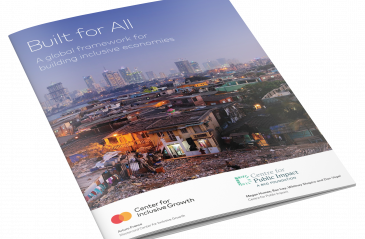
Systemic funding architecture: A proposition to catalyze urban climate finance

Social investment has the power to change lives for the better
Share articleSocial investment should be just another tool in the tool box
Share articleSocial mission organisations have huge capacity to deliver more impact into the future
Share articleWe put our vision for government into practice through learning partner projects that align with our values and help reimagine government so that it works for everyone.
Cliff Prior lights up at the memory.
“I remember my first visit in this job very clearly,” he says. “It was to a social enterprise called Spacious Place in Burnley, a town in the north of England that has suffered a lot from deindustrialisation. It is led by an entrepreneur who has been doing work with young offenders in prison by getting them ready for employment - only to find that there weren't any jobs for them.
“So he decided to create a company that would employ them. He bought an old mill and turned it into a mix of business units and contact centres, and it is now employing 65 people at a time. Without social investment he could never have got it off the ground. It's this kind of combination of social mission, entrepreneurial energy and doing the things that mainstream investment can't yet do.”
It's easy to see why Prior, the chief executive of Big Society Capital, likes this example so much. It sums up the importance of social investment and its power to change lives for the better. “Social investment is what enables charities, social enterprises and social mission organisations to do what they do,” he adds. “Just like the story from Burnley, charities and social enterprises across the UK are working on some of the toughest issues, but many want new repayable finance to increase their impact - and this is exactly where Big Society Capital comes in.”
Big Society Capital started work in 2012 to help make sure that charities and social enterprises could find appropriate and affordable repayable finance to meet their capital needs. A financial institution with a social mission, it has the dual purpose of championing and engaging in social investment. As a champion it seeks to increase awareness of - and confidence in - social investment; as an investor it provides capital to fund managers or specialist banks, who in turn provide finance and support to charities and social enterprises.
“We've invested about £250 million so far,” says Prior, “with the money coming from two sources: dormant bank accounts - the money goes through a complicated process before coming to us - and the four main UK high street banks. We are completely independent from government, but there are still rules around what we do with the money that are set in statute.”
He goes on to explain why this finance can't come from more traditional commercial sources. “Most social investments are small and there are also issues of specialism - mainstream investors may just not be interested in a small specialised area,” he says. “For example, if you're running a commercial enterprise and you want some capital for growth, it is likely that the commercial lender will put your house on the line as collateral. You might do that as you get the upside if the business is successful, but if you're a charity or social enterprise you take the risk. But there is no upside, so you need specialist investors who are prepared to provide that unsecured capital.”
Although Prior only joined the organisation in March, he can call on 40 years of experience in the social sector to guide him through the implementation of its four key priorities: basic lending for small and medium-sized charities and social enterprises; driving innovation; greater scalability; and participation - creating opportunities for the public to put some of their money into social investment. Prior, though, is also focusing on some other shifts in approach.
“We need to start with the social issue of each organisation and analyse if there is a place for social finance and what form it should take,” he says. “We also need more public participation. That not only means more money but on very different terms and it brings its own energy when compared to a traditional institution, and it would drive things forward in some really interesting ways.”
He goes on to identify “tone” as another area to focus on. “I don't think there will be a charity in the country that isn't aware of social investment, but we now need to move on to understanding when it is right and how it should be used - to get it to a point so that is just another tool in the tool box. We will have succeeded when people are comfortable with it; they know it is there, when to use it and are confident about deploying it when the time is right.”
And with new social issues coming to the fore, he says that Big Society Capital will be looking for projects where social investment can really move the needle. “For example, there is a strong initiative led by the Joseph Rowntree Foundation to tackle the poverty premium, which refers to the fact that the poor tend to have to pay more on pretty much everything - from power supplies to groceries. It really is an area that is ripe for some fundamental change.”
Prior is keen to stress that impact measurement has underpinned Big Society Capital's approach since day one. “We have an outcomes matrix that starts with a specific issue and then breaks it down into subsectors,” he explains. “A number of funds we have invested in and a number of social organisations are using it.”
He goes on to say that while there are plenty of global standards around impact assessments, what the sector currently lacks are the tools to do the measuring. “We have to have simpler systems that people know how to use,” he says. “In an ideal world, the impact measure is also an organisation's marketing tool as its demonstration of effectiveness. But impact assessment isn't as simple as doing your household accounts - impact is not a currency it is a commodity, and the value of each type of social impact is in the eye of the beholder.”
And it's also important to look to the long term, and not just the day-to-day, he adds. “We often assess impact as if we're shopping for it - ‘I want 100 ex-offenders not to re-offend'. But what happens next? Is there capacity to help 200 ex-offenders the next year and 300 the year after next? The capacity of social mission organisations to deliver more impact into the future is, if anything, more important than how much impact they create in the first year. Unfortunately, all too often we underestimate the importance of long-term capacity, and the spotlight is always on this year as opposed to what comes next. But we are determined to change this - starting now.”











